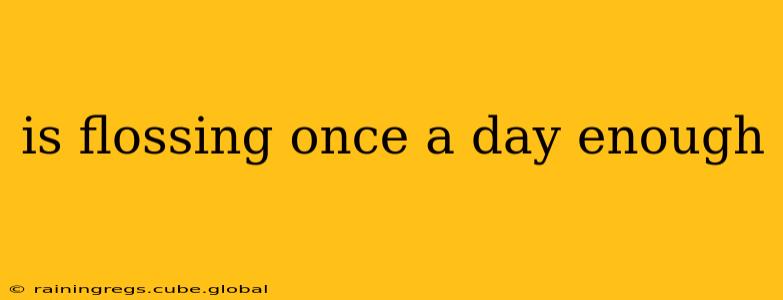Is Flossing Once a Day Enough? A Comprehensive Guide to Oral Hygiene
Maintaining optimal oral health is crucial for overall well-being. While brushing twice a day is widely recommended, the question of how often to floss often arises. Is flossing once a day enough? The short answer is: it's better than not flossing at all, but ideally, you should floss at least once a day, and preferably twice.
Let's delve deeper into the importance of flossing and address some common questions surrounding this essential aspect of oral hygiene.
What are the benefits of flossing daily?
Flossing is an integral part of a comprehensive oral hygiene routine. It removes plaque and food particles from between your teeth and along the gumline—areas your toothbrush can't reach. Consistent flossing helps prevent:
- Gingivitis: Inflammation of the gums, often characterized by redness, swelling, and bleeding.
- Periodontitis: A more severe form of gum disease that can lead to tooth loss if left untreated.
- Cavities: By removing food particles that contribute to bacterial growth, flossing significantly reduces the risk of cavities between your teeth.
- Bad breath: Flossing helps eliminate trapped food particles and bacteria, a primary cause of halitosis (bad breath).
How often should I floss?
While once a day is a good starting point, aiming for twice-daily flossing is the ideal scenario for maximizing oral health benefits. The best time to floss is before brushing, allowing your toothpaste's fluoride to better protect your teeth after you've removed food particles and plaque.
What if I miss a day of flossing?
Missing a day of flossing occasionally won't cause immediate harm. However, making flossing a consistent habit is key. If you miss a day, don't get discouraged. Just get back on track and continue with your routine.
What type of floss should I use?
Various types of floss are available, including waxed, unwaxed, and flavored floss. Experiment to find what works best for you. Some people find waxed floss easier to maneuver between tight teeth, while others prefer unwaxed floss for its purportedly superior cleaning ability. Consider dental tape as an alternative if you have larger gaps between your teeth.
Are there alternatives to traditional floss?
Yes, several alternatives exist, including:
- Interdental brushes: These small brushes are particularly useful for cleaning larger gaps between teeth.
- Water flossers: These devices use a pulsating stream of water to clean between teeth and along the gumline. They can be beneficial for individuals with braces or dental implants.
Is it necessary to floss if I have healthy gums?
Even if you have healthy gums, flossing remains crucial for preventative care. Consistent flossing helps maintain that healthy state and prevents future gum problems and cavities. Think of it as insurance against future dental issues.
What if flossing makes my gums bleed?
Bleeding gums can indicate gingivitis. While initial bleeding might occur, it should subside as your gums heal with consistent flossing. If bleeding persists for an extended period, consult your dentist. Gentle flossing is key; don't force the floss between your teeth.
Conclusion:
Flossing once a day is a significant step towards better oral health, but aiming for twice a day is recommended for optimal results. Remember to combine flossing with regular brushing and twice-yearly dental check-ups for complete oral care. Choose the flossing method that best suits your needs and maintain consistency for a healthy and beautiful smile.
